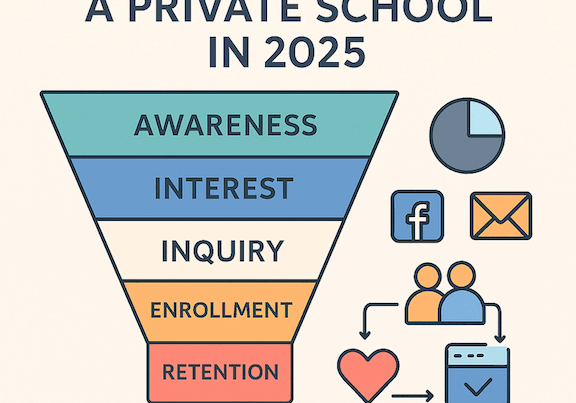
If there is no other concept you learn regarding school marketing, you should grasp search engine optimization (SEO). When it comes to increasing enrollment, learning about and implementing SEO for school websites is key.
Without SEO, your website will receive minimal traffic, and your school will experience a lack of interest in its programs. In this guide, the basics of SEO are outlined so that you can boost your school marketing without the need for an expert.
What is SEO
SEO, or search engine optimization, is an umbrella term for marketing efforts that help websites rank in the top results for specific search terms. Search engines check your website for different features and factors to decide if it’s recommendable to web surfers. The goal of these search engines is to recommend the best relevant websites for people searching online.
Marketers who implement SEO strategies use these commonly known factors to craft a website. By following these “rules,” a website has a better chance of being recommended to the right audience.
SEO efforts come in different forms, including:
- Frequently updating a website with fresh and relevant content
- Strategically crafting web copy
- Techniques for better search engine “crawling” of a website
- Critically using images
- Researching and integrating keywords and phrases
- Making the website functional for different devices
Search engines do not outline how their algorithms rank websites, but the marketing industry researches SEO to find best practices. Further, SEO trends evolve, so maintaining knowledge of up-to-date practices is essential.
Branded vs Unbranded Searches
Often, schools will ignore further tactics to increase the accessibility of their website because they’re comfortable knowing prospective families will find the institution online if they search for it by name. These are called branded searches because the searcher is asking the search engine for results that only pertain to the brand name.
Searching for a brand name online will almost always result in finding that brand quickly. Consequently, school website managers are correct in believing that interested students and parents will find them online.
These school website managers are misguided, however, if they believe that prospective families will find them if they are not already interested in the institution. School websites that have not implemented correct SEO techniques will not show up in top search results for any searches other than their exact name.
As a result, prospective families will not discover it during their general web searches. In other words, unbranded searches (more general searches rather than searching for a specific brand) will not result in traffic to the school’s website.
In conclusion, SEO is important for schools that wish to welcome traffic from prospective families. Using SEO will allow a school to reach new audiences and draw in more interested families than branded searches ever will.
How Will SEO Help the School
Similar to any other industry, schools must maintain a robust online presence to market to new families and facilitate thriving communities. Unfortunately, having a website is not enough anymore to maintain this online presence properly.
SEO techniques are now essential to running an effective website marketing campaign. Therefore, the best school website manager must stay knowledgeable of SEO practices and implement them regularly and in its content. By using SEO practices for websites, a school can:
- Give a perception of higher quality
- Improve reach to prospective families
- Offer an excellent resource for information about the institution
- Experience a higher return on investment for free
SEO can achieve all the above goals if used properly by improving the functionality and usability of the website. In addition, SEO tactics promote frequent updates and fresh content, which builds credibility and trust with visitors.
For instance, think about when a prospective family finds your institution through a general search online. Will they be impressed with the school website’s updated and relevant content? Will they be able to use and enjoy the website regardless of the device they’re using?
Visitors trust brands more than invest time in creating and managing a functional and well-designed website. Further, they appreciate websites that offer relevant and helpful information that answers all their questions and feels welcoming. Therefore, an institution should prioritize impressing new families with an SEO-focused website.
In doing so, you can benefit from increased enrollment without spending money on marketing materials or events.
How To Use SEO for Schools
Now that you understand why SEO is so important for the school’s website, you need to learn how to use it to your advantage. Implementing a proper SEO strategy can be time-consuming, but the results will be worth it. Without a marketing expert, you can still use several SEO tactics with only basic research and some creativity.
If you choose to hire an agency for help, such as designing a website, question their practices. Several agencies do not implement SEO strategies into their designs, rendering your website useless. These agencies might have insufficient experience with SEO and focus too heavily on aesthetic design.
Implement Keywords and Phrases
When marketers contemplate SEO, their minds instantly think of keywords. Keywords are the basis of how search engines index your website in their database and reference them for relevant searches.
Keywords can be single words but are often phrases that represent a topic. Search engines pick apart the phrases that web surfers type into search engine bars and match them to content on websites. Several tools are available to marketers and business owners to look up the frequency of keyword use to integrate them into their websites.
By researching the best keywords for your niche, you can integrate them into your website and increase the chances of web surfers finding you. Picking the right keywords means you can increase the traffic to your site and improve the quality of your visitors. In other words, your visitors are more likely to be interested in what you offer and have a higher chance of enrollment.
To use keywords, define what you want to underscore on your school’s website. Do you need to emphasize your thriving science program or highlight a unique organization? Research the keywords that prospective families search to find these unique selling points and use them throughout your website.
Once you’ve chosen keywords, use them naturally throughout the website, but focus on including them in titles, headings, and the first 100 words of your content. Additionally, add them to your website’s meta description and other important tags.
Frequently Create New Content
A website is only as effective as the content you publish. Without proper content, website visitors will not see the information they came for and will likely never visit again. Your website content is also what search engines analyze to rank your website, so it is essential for driving new traffic.
Content creation can come in different forms but should be based on words or at least supported with words so that searches online can lead to your content. Using engaging videos and pictures will cause search engines to rank your website higher in search results. Additionally, several website managers choose to run blogs, which is a great way to continually update the site with new content.
Offering valuable and educational content is also a selling point for website visitors, as they will think highly of your site if they can intellectually benefit from visiting. In other words, consistently posting insightful content within your niche will establish you as an authority in your field and build trust with your audience.
Prospective families and your current community will greatly benefit from content like this. They will trust the institution as a center for growth, education, and community, which is perfect for a school.
Additionally, search engines will flag your website as a resource for those searching for relevant topics matching your content. For example, searchers might type in a phrase like “how to handle a kid with failing grades” and be led to your insightful blog article giving guidance on the topic. As a result, they’ll be exposed to not only your resources but your entire institution and might be interested in enrolling.
Prioritize Readability
A common mistake committed by website managers when uploading content and copy onto the site is uploading huge blocks of texts and not taking advantage of headers. Inexperienced content creators haven’t been exposed to formatting choices like headings and blocking, but the use of these tools can help differentiate subtopics within lengthy content.
When searchers are looking for answers online, they often skim the text to find exactly what they need. Adding headings and subheadings can make the text more readable, and visitors can quickly find answers to their questions.
In addition, search engines analyze text on websites and can focus on important sections by breaking down content according to formatting, such as looking for text in H1, H2, H3, and so on. For example, if you break up the text with headings and subheadings, search engines can better understand the messaging and direct searchers to exactly the answers they want.
Further, make sure that the length of your text is appropriate. Usually, clear and concise is better than lengthy.
Use SEO for School Websites
By following a few simple tips regarding SEO for school websites, without needing marketing expertise, you can improve your school’s website and increase traffic. As a result, your institution will see higher enrollment and enjoy improved brand authority within the education industry.
VujaDay can help supplement your marketing tactics by offering expert advice and support with your digital marketing. If you’re interested in receiving further help, contact us today!



